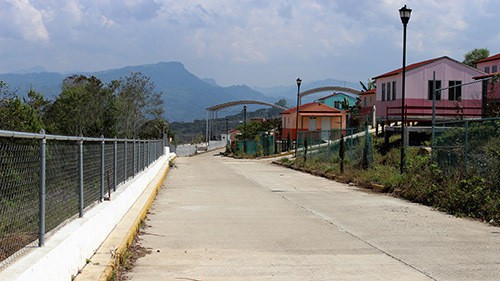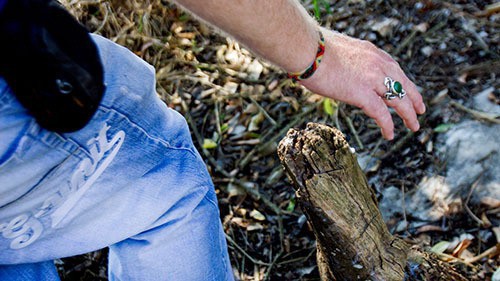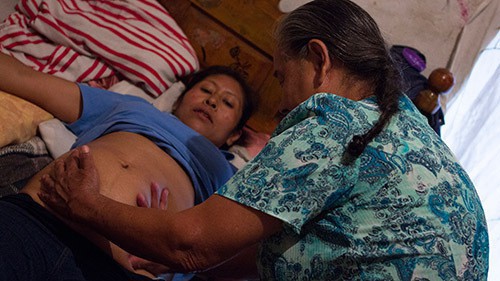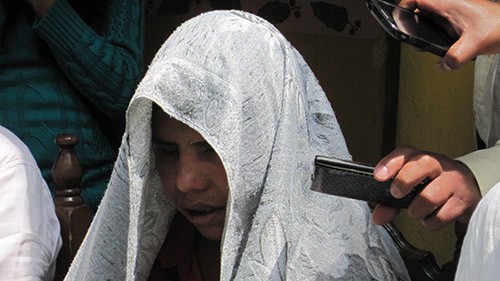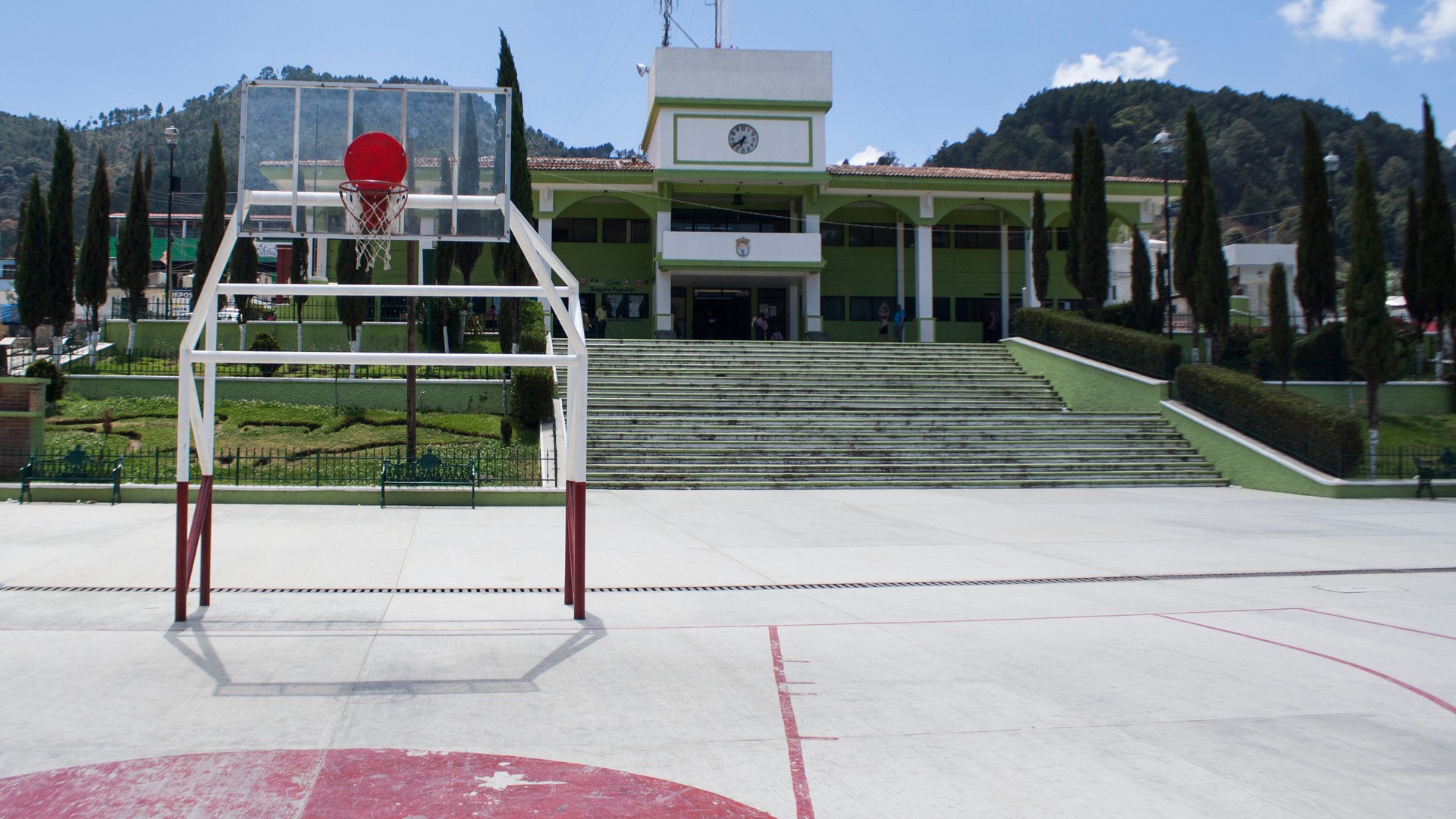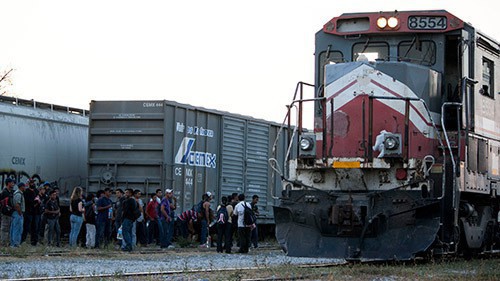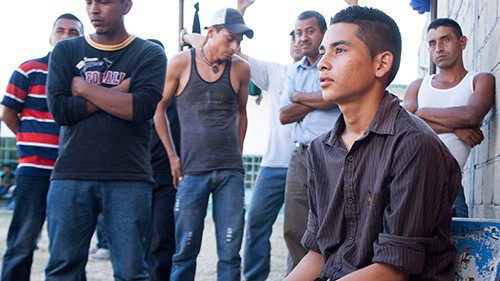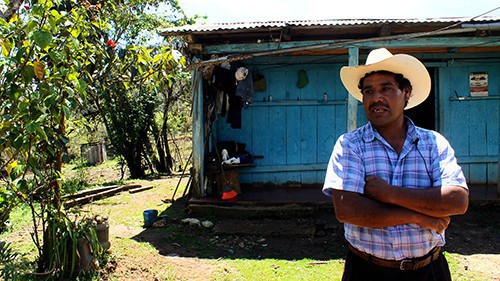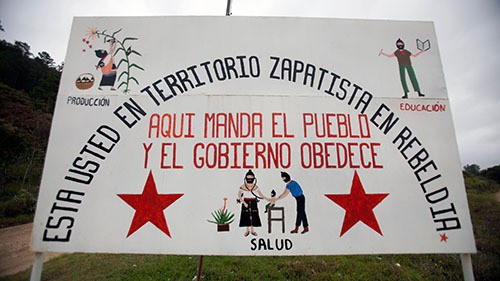
Fair trade coffee a big business, but indigenous growers not getting rich
By MARLENA SAUCEDA / Cronkite Borderlands Project
Published Sept. 25, 2014
ACTEAL, Chiapas, Mexico – A cup of organic fair trade coffee begins in places like the 2.5 acres of highlands forest where Mariano Saramanco Gutierrez has been growing coffee almost all his life.
Saramanco Gutierrez’s coffee plot, inherited from his parents, is a short walk down the road from his small home. It is spread across two hillsides separated by a small creek. The shrub-like coffee trees vary in width and height and are interspersed throughout the tropical cloud forest, set in between larger trees that drip with dew even as the day nears noon.
Saramanco Gutierrez shows off one plant, full of large, dark-green leaves and covered in bunches of green or red coffee cherries. Then he moves down the hill to another plant. Just a few spotted leaves cling to it; cherries hang on the thin, bare branches in groups of two or three. The plant is infected with “roya,” rust fungus. Saramanco Gutierrez says that 90 percent of his plants have the disease.
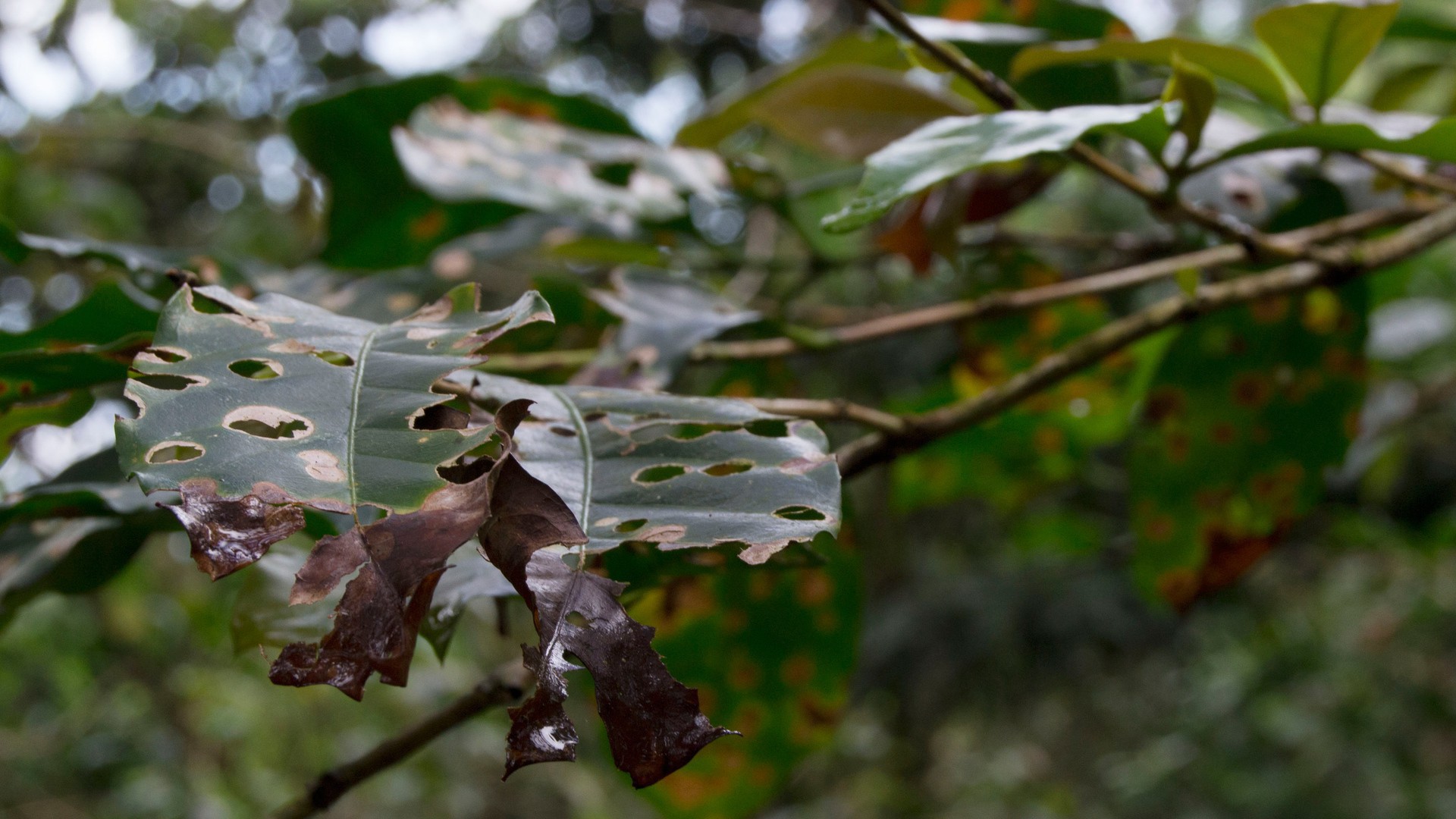
In a good year, the 47-year-old indigenous farmer and his wife who helps him maintain and harvest the crop can earn around $4,000 for their organic fair trade coffee, the main source of income for the family of six. The rust means it might not be a good year.
Indigenous families like that of Saramanco Gutierrez are the backbone of Mexico’s organic coffee industry. Coffee is grown in 88 of the 122 municipalities in Chiapas, and 45 of those are nearly 100 percent indigenous, Marco Antonio Botello Utrilla, a director in Chiapas’ Institute of Coffee, said.
“One million people live off of coffee in Chiapas,” Botello Utrilla said. That’s slightly more than 30 percent of the population.
Of the 256,000 registered producers, which include cooperatives, civil societies, rural growers and plantations, two-thirds are made up of Mayan descendants like the Tzotzil, Tzeltal, Chuj and Zoque communities. While coffee is not native to Mexico, having been introduced by the Spanish in 1785, indigenous farmers have grown coffee on their own as a cash crop since the early 1900s.
The unstable nature of worldwide coffee prices has motivated these farmers to find a niche that would protect them from large drops in coffee prices: the organic and fair trade markets.
More organic coffee is grown in Chiapas, a Southern Mexico state slightly smaller than South Carolina, perhaps than anywhere else in the world. Sixty-four percent of the land devoted to organic-certified production in Mexico is in Chiapas, and Mexico is the world’s leading producer of organic coffee, according to the U.S. Department of Agriculture’s 2013 Global Agricultural Information Network report on Mexico.
The state began its revolution in coffee production in the late 1980s as organic and fair trade products gained popularity with consumers in Europe, the U.S. and Asia. As global coffee consumption rose, niche markets for specialty, high-quality coffees appeared, opening the door for a new, higher-paying market for small-scale indigenous farmers.
“As small producers, it’s been a fight to win over the fair trade market over the last 20 to 25 years,” Abraham Lopez Ramirez said. An indigenous producer himself, Lopez Ramirez is the president of the Museo de Café, a network of nine different cooperatives in the San Cristóbal de las Casas area.

“With our quality of coffee, we started to look for a market. It was principally in Europe where we began to take over niche markets. There they began to think, to encourage the idea that organic producers should be paid well, that they should get a fair price,” Lopez Ramirez said.
This idea has allowed groups of indigenous farmers to create cooperatives and unions, systems through which hundreds of families pool their harvests together to export in large volumes. These groups worked together to obtain fair trade and organic certificates and now process and export their coffee, which ends up in posh cafes all over the world.
Saramanco Gutierrez belongs to the Maya Vinic cooperative, which was formed in the wake of the massacre of 45 members of a Roman Catholic support group known as Las Abejas – the Bees – in the impoverished indigenous community of Acteal in December 1997. Although they kept separate from the revolutionary Zapatistas who had rebelled against the government, Las Abejas professed support for some of the Zapatistas’ goals. The 45 people, including women and children, were gunned down during a prayer meeting by members of a pro-government paramilitary group. No one was ever convicted.
The massacre drew worldwide condemnation and left the community struggling to find a way to move forward.
The answer, said Reynaldo Arias Ruiz, one of the four directors of Maya Vinic, already was on their land.
“We had to work, the community had to work to survive with their families,” Arias Ruiz said. “The idea was that they had their plot, they had their coffee, their corn, their beans. The first objective was coffee because we here in Chiapas, we only find money when we sell coffee.”
In 1998 they arranged their first export. Farmers came from around the area to join and sell coffee. Importers came from around the world to help by buying coffee. Individuals arrived from Japan and Switzerland and offered to establish connections between Maya Vinic and purchasers around the world.
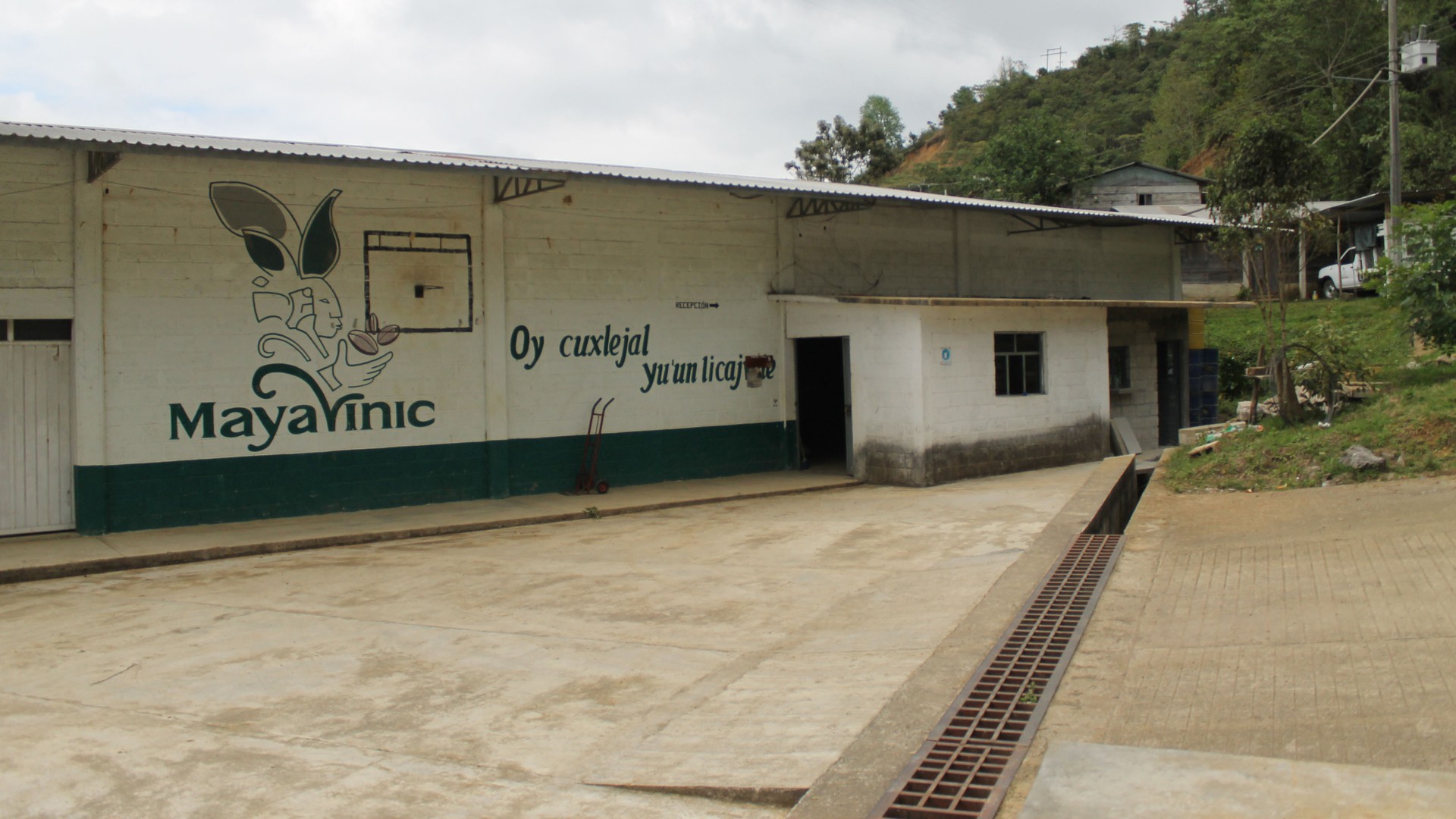
“Solidarity groups came directly to Acteal to support us. Individuals came, in solidarity, to help. They supported our production by buying our product. That’s how we found coffee purchasers in different countries,” Antonio Ruiz Perez, another of the directors, said.
The tragedy of the massacre ultimately led to the globalization of Maya Vinic’s business, giving its farmers a steady source of income year after year.
The marketing process begins when Saramanco Gutierrez and other members of the cooperative walk to the warehouse with their ripened coffee cherries in small sacks throughout the harvesting season. The cooperative pays them a base price that is agreed upon at the beginning of the coffee season. If the price rises by the time the coffee is processed, packaged and exported, farmers receive more money.
This year the price paid to farmers has averaged out to about 45 pesos per kilogram, a little less than $4 for a kilogram – 2.2 pounds – of coffee cherries. It is a higher price than usual because worldwide coffee prices rose dramatically this year, nearly doubling from mid-February to mid-March. Usually farmers are paid from 29 to 35 pesos per kilo, Maya Vinic director Mariano Perez Vasquez said.
“It isn’t enough to support their families for the whole year,” Perez Vasquez said. “It’s annual work to clean it, care for it and, when the harvest comes, to cut it with their families. We don’t have schedules, we leave at 6 in the morning and, if we have to, we don’t return until 6 in the evening. Here we are poor, and we have to work from sun to sun. That’s what the indigenous have always done.”

Smaller farmers, some with less than an acre of land who produce as few as 50 kilos per year, often rely on the cooperative for support.
“Supporting the smaller amongst the larger, that’s what being a cooperative is about,” Perez Vasquez said.
The rust fungus that is just now hitting the highlands where Maya Vinic’s members live will greatly reduce the amount of coffee that producers are able to harvest and sell. It also means that the infected plants will need to be removed and replaced with new, young plants of a strain that is able to resist the rust.
Arias Ruiz said the cooperative has taken seeds from the resistant plant to sprout seedlings, tiny plants that they nurture at the cooperative headquarters before distributing them to farmers in need. It will take a year to replace the old plants with the new and two to three years for the new plants to mature before they produce good cherries. It will likely be five years before farmers who were hit hard, like Saramanco Gutierrez, are able to reach their full production volumes again.
The cooperative and its members face many challenges that go beyond infestations like the rust fungus. They compete directly with local intermediaries, people known derisively as “coyotes,” who buy coffee directly from growers and sell it to multinationals.
These coyotes aren’t registered with the government the way Maya Vinic is, so they don’t pay taxes and they aren’t certified organic or fair trade, meaning they don’t pay for the certifications either, Perez Vasquez says. Buildings covered in painted words offering to buy coffee dot the roads from San Cristóbal de las Casas to the highlands. The coyotes can sometimes pay a higher price than the cooperatives in the area. When they can, farmers sell to them instead, even when they’re members of a cooperative like Maya Vinic.
“We don’t want them to sell to the intermediaries, but they go with the price,” Perez Vasquez said.
Because of the way fair trade works, it only makes a substantial difference when coffee prices are low or drop unexpectedly. Purchasers pay a base price of at least $1.40 per pound. There is a 30-cent organic premium and a 20-cent social premium that is added onto that, Lopez Ramirez said. Usually cooperatives can get an extra 2 to 5 cents per pound for quality. This means that the lowest price organic-certified fair trade producers receive is $1.90 per pound. Occasionally, coyotes can pay 5 to 10 cents more than that.
Although individual farmers don’t receive the extra help of the organic and social premiums when they sell to intermediaries, they would still rather get the higher price, since they immediately see the return.
“The strength of fair trade ends when [the price] rises above 140 cents per pound,” Perez Vasquez said.
Whatever the price, Maya Vinic workers gather coffee cherries at their warehouse in Acteal, where they soak, dry and process them in a mill that removes the green pergamino beans from their shells and sorts them by weight and color. They gather them in 60-kilogram sacks and stack the sacks until it’s time to export them. The sacks are driven nearly 240 miles to a seaport in Veracruz, where they are packed into shipping containers and put on a ship to New York City.
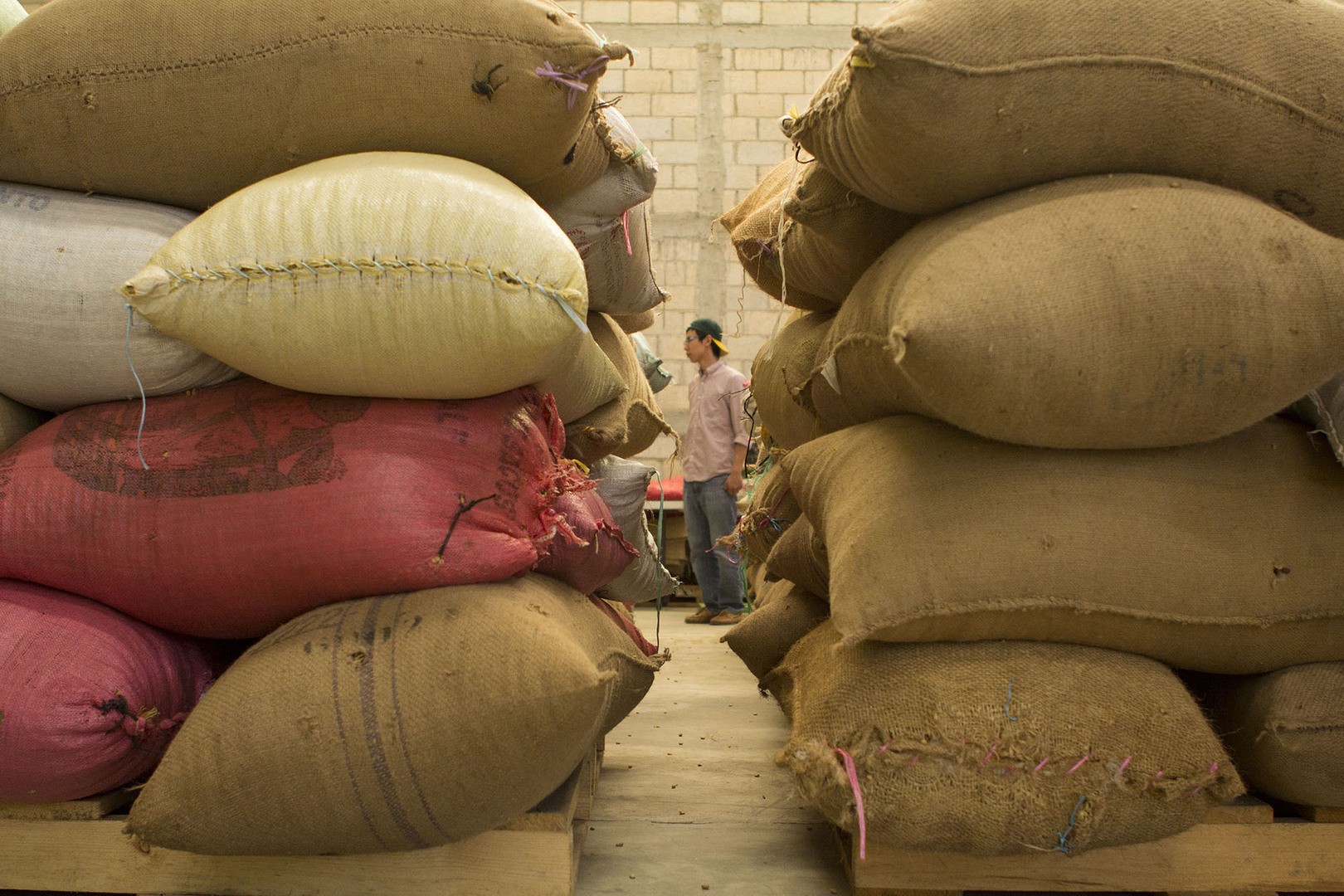
Monika Firl is the producer relations manager at Montreal-based Cooperative Coffees, the only importer of Maya Vinic’s coffee in the U.S. Firl was living in San Cristóbal de las Casas and working with coffee cooperatives at the time of the Acteal massacre. She had established a relationship with Maya Vinic prior to the massacre and remained in contact with them after moving to Montreal in 2001, where she began working for Cooperative Coffees.
By then, Maya Vinic was preparing its first export. But a buyer in South America who promised to buy all of their stores for a great price backed out of the deal, leaving Maya Vinic wary of arranging another sale to a foreign buyer. Firl, however, already had established a high level of credibility with the cooperative and was able to facilitate Maya Vinic’s first export to the U.S.
“Our motivation was everything they’ve been through and how important a steady source of revenue was for them,” Firl said. “We were wanting to be in support of their struggle and recovery because they’re good people and they produce quality coffee … to be able to offer them $1.46 per pound when the market price was 80 cents was amazing for them.”
The business partnership between Maya Vinic and Cooperative Coffees began in 2001, before Maya Vinic had a fair train certificate. Then coffee market prices were very low and fair trade prices could make the most difference. From 2004 to late 2010 global market coffee prices remained below $1.50 per pound before skyrocketing to a market high of $3 per pound in early 2011.

During periods of low prices Cooperative Coffees’ minimum price to producers is $2 per pound. When prices are extremely high, as they were in 2011, or above $2 per pound, as they are now, the importers base their purchasing price off of the worldwide market and then add on the social, organic and quality premiums. But they can’t afford to double their price when the market price is at $3, Firl said.
Preventing producers from selling to coyotes for slightly higher prices is a shared responsibility between Maya Vinic and Cooperative Coffees, Firl said. The temptation for producers to get about 5 pesos more per pound is high, so the cooperative must maintain good relationships with their producers, even when market prices are high.
“They have to keep the co-op strong because the market will go down again,” Firl said.
While Firl said that it’s difficult for her to judge whether the lives of the members of Maya Vinic have improved because of her personal relationship with them, she acknowledged that Maya Vinic producers are still very poor. There are larger political and social challenges in Chiapas that the cooperative must deal with, she said.
“They live in remote areas, some of them still have dirt floors, some of them still don’t have potable water,” Firl said. “It’s not like this has solved their problems … but it’s something to hold on to, a little part of their lives that they can control.”
Since 2001, Maya Vinic has exported an average of five containers of coffee to Cooperative Coffees every year. This has added up to a total of 1.045 million pounds.
“We could purchase three or four more containers from them [per year] if they could meet the demand,” Firl said.
And the demand for their coffee is growing.
Some of the roasters who buy Maya Vinic’s coffee from Cooperative Coffees have visited Chiapas. They not only admire the quality of the coffee but appreciate the story behind it.
“It’s just a very dramatic story, and it’s true and it illustrates what’s possible. They have overcome a lot,” Firl said.
Firl says that their minimum price to roasters is $2.85 per pound of green pergamino coffee. Roasters across the U.S. give Cooperative Coffees purchasing schedules of how much coffee they want and when they want it and the importers meet those demands. Roasting companies receive the coffee, roast it and sell it either as single-origin or blend it with other kinds of beans.
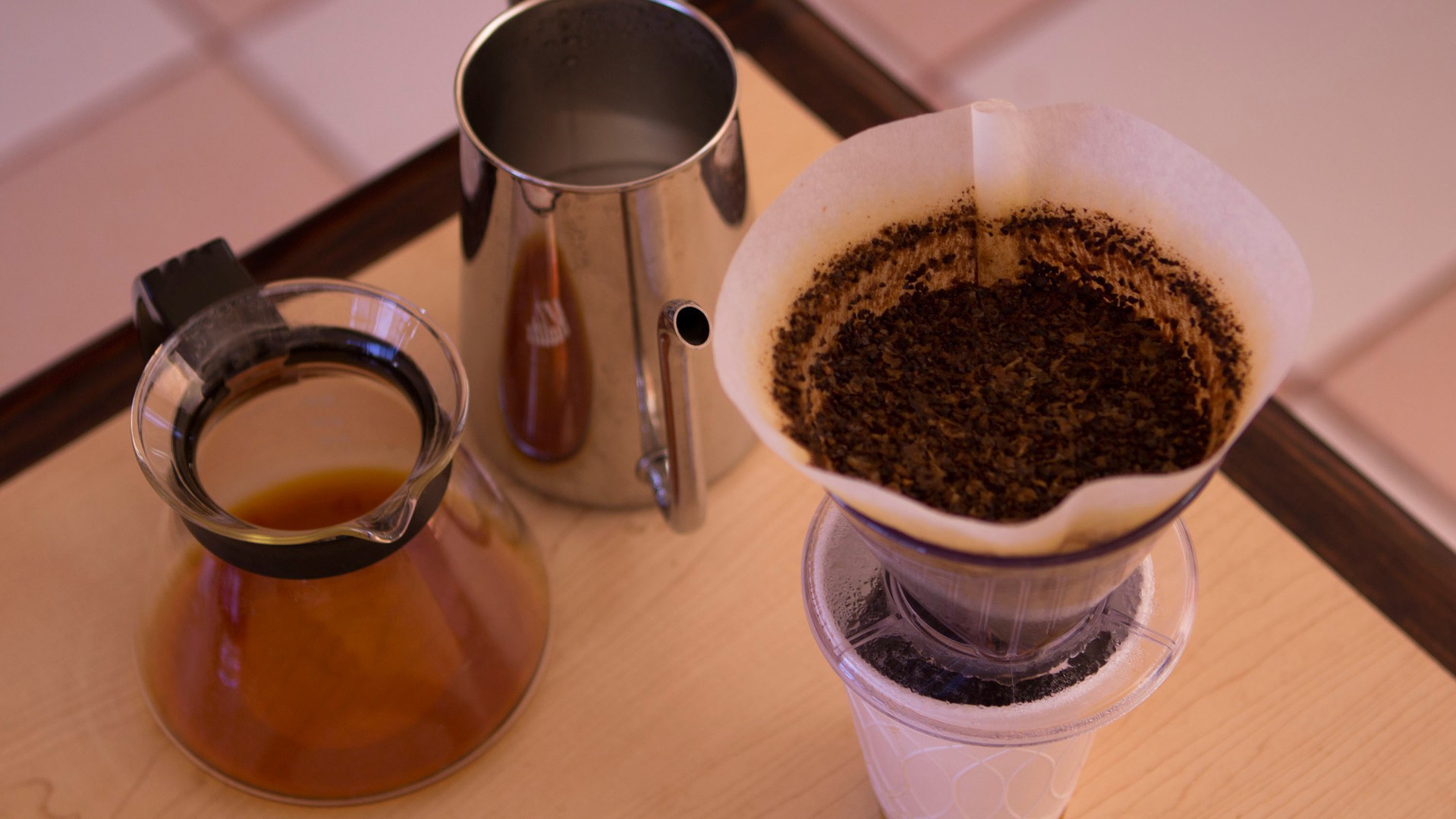
Mark Glenn, an owner of Conscious Coffees, a roasting company in Boulder, Colorado, said he has been buying Maya Vinic coffee from Cooperative Coffees for more than 10 years.
The coffee, Glenn said, is “overwhelmingly popular” with the cafes, grocery stores and consumers.
Because of coffee’s seasonal nature, they only stock Maya Vinic’s coffee, which they market as their Organic Mexico roast, for eight or nine months out of the year. When they don’t have it in stock, Glenn says, he gets frequent calls from buyers asking when they’ll have it again.
While the flavor and body of the coffee is very good and consumers like it, Glenn said he likes to think that its popularity is due to a loyalty that consumers feel to Mexican producers, neighbors of the U.S.
Glenn said that many of their loyal buyers are aware that by purchasing fair trade coffee from indigenous farmers, they are supporting remote, impoverished communities. He said, however, he doesn’t think they understand how poor the Maya Vinic producers continue to be, despite the fair trade label.
“The vast majority of our consumers do not have the ability to empathize with the living standards of the producers,” Glenn said.
Conscious Coffees and other roasters have made efforts to spread awareness about the struggles of the cooperatives. They’ve started a “roya fund” to provide Maya Vinic and other Latin American cooperatives with financial support while their production volumes, and incomes, take a hit from the fungus.
If production levels at Maya Vinic drop, however, roasters like Cooperative Coffees will turn to other sources to meet the demand for organic coffee from Latin America. Organic coffee from Honduras, Peru, Bolivia and other Mexican and Central American regions can replace the Maya Vinic roasts and consumers will still be satisfied, Firl said.
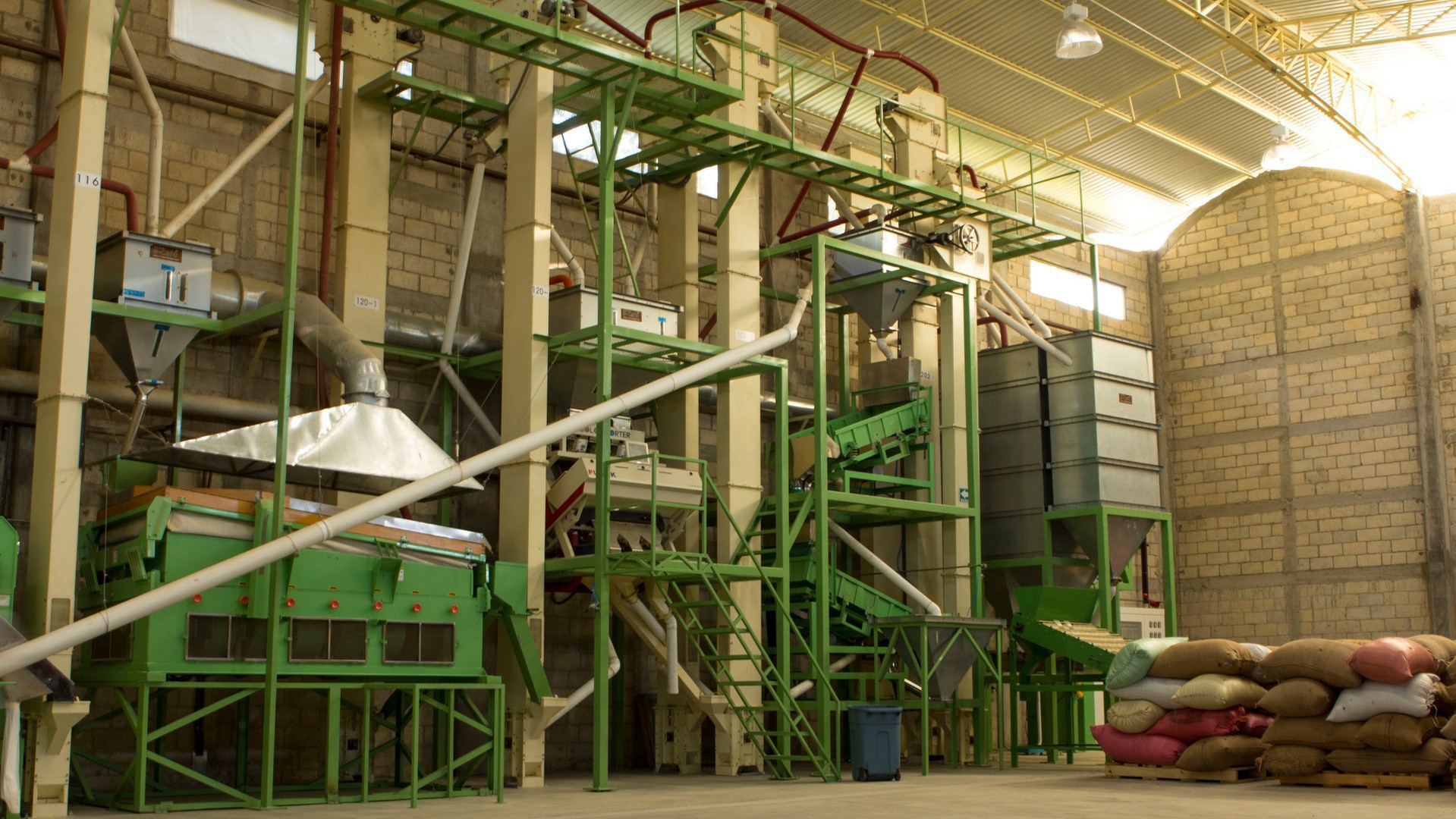
Brian Buckley, co-owner of Innisfree Poetry Bookstore and Cafe in Boulder, agreed that he has other options to serve his customers.
As an all-poetry bookstore and cafe across the street from the University of Colorado campus, Buckley said the cafe he and his wife opened in 2010 has a steady customer base. They’ve remained open, he said, because they carry locally roasted Conscious Coffees. While they bring in revenue from book sales, 60 to 70 percent of their revenue comes from coffee.
The organic Mexico roast is one that customers are “glad and excited” to see when they walk in, Buckley said, since the cafe rotates coffees every morning.
He said they will monitor the impact of the rust fungus to see what the cafe can do to help. Whether that means he’ll charge more for the organic Mexico roast or just make extra efforts to educate his customers Buckley is not yet sure.
In the meantime, the Maya Vinic fair trade coffee is a hit. It may be loyalty to Mexico or seen as a way to keep families together or the sweet, chocolaty flavor that drives customers to buy Maya Vinic’s coffee, Buckley said. But when long-term relationships with farmers are discussed, Chiapas and Maya Vinic always come up.
Many of Buckley’s regular customers, like Joe Bryan, care to know where their coffee is coming from. For Bryan, a 40-year-old geography professor at the University of Colorado, walking into Innisfree and ordering a cup of organic, fair trade coffee from Chiapas is a political statement.
Bryan said that he likes to be able to buy coffee where he can follow the chain back to the grower. Everywhere he’s lived in the U.S., he said, he’s had places to go to get high quality, fair trade coffee.
“Fair trade tastes far better,” Bryan said.
If organic coffee from Chiapas is available fewer months of the year, Bryan doesn’t think it will have much of an effect on his daily life. He also doesn’t think that means he’s indifferent to the plight of the farmers in Chiapas.
Bryan said that as an educator and a person who has traveled to Chiapas and other impoverished coffee-producing areas, he has a different perspective on fair trade than most members of the niche market. While Conscious Coffees and Innisfree Cafe make efforts to educate customers on the still-dire living conditions of fair trade coffee producers, they can’t do much to combat consumer complacency.
“They’re vulnerable to the fact that someone comes in, buys coffee, sees a photo of a smiling coffee picker in country X and thinks they’ve done something good … but they haven’t,” Bryan said.
Bryan said that in recent years he’s adopted a much more critical take on fair trade but still prefers it to coffee that is sold with no mention of the social aspects behind the production of the commodity.
Back in Chiapas, Saramanco Gutierrez said he does think selling coffee with Maya Vinic is better than it was selling to the coyotes.
As he walked back to his simple stone house where his wife and children work on different tasks in the muddy yard, he said he’s not sure what he’ll do until his coffee plot is healthy again.
“I grow corn and beans to eat,” he said. “But I’m going to have to buy more corn this year. It’s also not growing well.”

